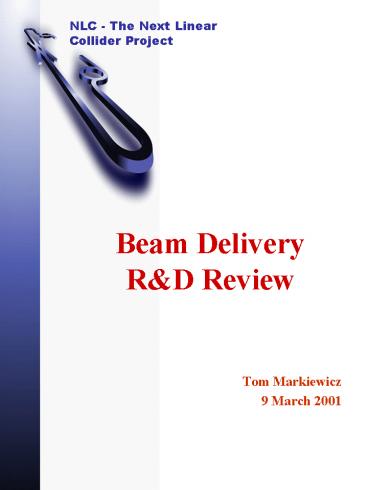Tom Markiewicz - PowerPoint PPT Presentation
1 / 14
Title:
Tom Markiewicz
Description:
NLC - The Next Linear Collider Project. Tom Markiewicz. Talks Prepared for ... (Crab) ... interferometer with sealed air-filled arms; feedback loop open ... – PowerPoint PPT presentation
Number of Views:36
Avg rating:3.0/5.0
Title: Tom Markiewicz
1
Beam DeliveryRD Review
- Tom Markiewicz
- 9 March 2001
2
Talks Prepared for this Committee
Collimation Issues Tor Raubenheimer Final Focus
Issues Andrei Seryi Collimator RD Program
Josef Frisch Vacuum RD Program Leif Eriksson
3
BDIR Mission Statement
- Use requirements of
- Emittance preservation Luminosity stability
- Machine Personnel protection
- Detector background limitations physics
requirements - Reliability Cost
- Installation, maintenance, upgrade flexibility
- to develop requirements and tolerances for all
hardware - Tunnel Enclosures
- Power Supplies
- Supports
- Magnets
- Vacuum
- Movers
- Shielding
- Collimators
- Dumps
- RF (Crab)
- Instrumentation
- Demonstrate through analysis, simulations,
example or RD that requirements and tolerance
are achievable
4
Current BDIR RD Program
- Vibration Suppression
- Understand nature of ground motion its effect
on the lattice - Survey /or Measure ground motion
- Seismic
- Cultural
- Develop tolerance criteria and the means of of
measuring compliance - Develop means of suppressing effects of GM
- Active
- Passive
- Demonstrate performance of suppression techniques
- Collimation
- Development of rotating consumable collimator
- Development of rotating liquid metal renewable
collimator - Wakefield measurement and interpretation
- Material damage RD
- Other
- Vacuum RD Leif
- Magnet RD
- Dump Window RD
5
Active Vibration Suppression RD Status
- Caveats
- Tolerance in each degree of freedom needs to be
better tabulated - Choices dependent on QD,QF magnet technology
choice and detector design - Optical Anchor
- Position of a lightweight mirror stable to a
resolution of 0.2nm using a 10m interferometer
with sealed air-filled arms feedback loop open - Position of a lightweight mirror controlled
absolutely, over 1 hour, to lt 1nm by closing
feedback loop with fringe driving piezo - New version of above under construction at UBC
- Inertial Sensor
- Conceptual mechanical design of sensor
- Conceptual design of electronics tested shown
to have adequate noise - DAQ Feedback algorithm
- Commercial DAQ software tools purchased
- Algorithm development and simulated performance
in progress - Intra-bunch Feedback
- Oxford University staff active
- Conceptual design of IP position feedback loop
and implementation complete - Bench tests and algorithm efficiency study
imminent - Beam tests in planning stage
6
BPM Processor Simulation
7
System Block Diagram
8
BPM Scope
Response at BPM
First 100 ns
Full bunch train
9
Active Vibration Suppression RD Goals
- To a certain extent, 1nm control in one d.o.f.
has been demonstrated and the rest is merely
engineering - The rapid loss of luminosity with offset and the
smallness of 1nm creates a crisis of confidence - Reasonable people can disagree at the level of
demonstration required to believe that this
problem is adequately under control. - Solution in principle done
- Non-beam demonstration of the appropriate level
of relative stability of the appropriate number
of mechanical magnet equivalents of the
appropriate masses and sizes, in 3-d,
incorporating compensation slow drift and sudden
disturbances Next stage planned - Beam tests demonstrating luminosity stabilization
of a real FF under discussion
10
Active Vibration Suppression Plan
Define QD0/QF1 Detector
Develop Optical Anchor
Develop Inertial Sensor
Develop Feedback algorithm
Refine Tolerances
Test on Rigid block
Test on Rigid block
Demonstrate sub 1nm Relative Motion of two long
magnet systems
Demonstrate luminosity stability with sub 1nm
resolution
11
Collimator PrototypeRD Status Accelerator
Physics, BD, Special Projects
- Simulation Experiment
- Lattice
- Required collimation depth
- Collimator load (halo)
- Muon production shielding
- Personnel protection shielding
- Collimator damage thresholds
- Pulse heating
- Single shot damage
- System efficiency
- Wakefield jitter amplification
- Beam measurements
- Analytic estimates simulations
- Proof of principle prototypes see J. Frisch
- Rotating cylindrical wheel
- Liquid Metal Wheel Follower
12
Collimation RD Goals
- To a certain extent, rotating collimator solution
satisfies lattice tolerances and beam dynamics
and the rest merely vacuum engineering - Smallness of apertures, magnitude of beam power,
fear of unknown halo sources cause discomfort - Reasonable people can disagree at the level of
demonstration required to believe that this
problem is adequately under control. - Non-beam demonstration of collimator surface
flatness, aperture control planned - New ideas to increase collimation depth
(apertures) and thereby decrease wakefield
concerns-underway - Beam tests demonstrating optical solutions to
halo control in a real FF under discussion
13
Collimator Prototype Plan
Develop Rotating Collimator P.of P.
Develop Liquid collimator P.of P.
Refine lattice understand collimator
Requirements Tolerances
Wakefield Requirements
Tolerance Tests
Technology Choice with refined requirements
Collimator Prototype
Beam Tests of Optical /or Mechanical systems
14
Beam Tests
- Advantages
- Suitability of proposed solution
- Hardware
- Lattice
- Is often in the details of the implementation
- Exact cancellation of high order aberrations
- Coupled or not-considered effects
- Les than ideal input conditions
- Temperature drift
- External noise
- Disadvantages
- Details of SLC, FFTB, Sector-2, etc. may not be
germane to NLC - Beam tests ALWAYS take a great deal of effort
- Plans are under study































